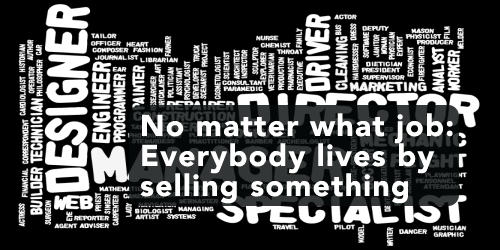
What is the correct title for a salesperson’s role? What should I call myself? This is a contentious issue… And a question we get asked frequently. The answer will depend on why you are asking the question. Are you asking the question because:
- You think the title ‘sales representative’ doesn’t adequately describe what you do?
- You are ashamed of being called a ‘salesperson’ or ‘sales representative’ for whatever reason? (see next week’s article for more details)
- You think ‘salesperson’ or ‘sales representative’ doesn’t represent or position you in the best light as a professional business person to your clients, etc.?
All of these questions are valid and can present problems if not properly addressed. Simply put, all of these issues could be solved if everyone were happy to accept that selling is everybody’s business and everybody lives by selling something. If that were the case then no one would worry about what title they had because we all would agree that we are all in sales. Nice but this is not going to happen anytime soon. So let’s address each area so that whatever you end up calling yourself by way of role title you are doing so in the clear light of day with no cognitive dissonance and can feel proud about it and your role in sales. I am going to tackle questions 1 & 3 in this article. Here it goes: Sales role titles – their relevance and suitability It is true that not all sales roles are built the same. There are a range of sales roles that fall under the title of ‘sales’; however, they vary in levels of sophistication, job function and perception by our clients and key stakeholders. Let’s look at the standard range of sales job titles and functions on offer:
- Sales Representative, Sales Executive, Sales Consultant
- Direct Salesperson
- New Business Development Manager, Business Development Manager
- Technical Sales Representative (insert medical, scientific, etc. in place of Technical)
- Sales Engineer
- Relationship Manager, Consultant, Client Relationship Manager
- Territory Manager , Territory Account Manager
- Account Manager, Key Account Manager, Strategic Account Manager, Major Account Manager
- Telesales, Internal Sales, Call Centre Operator, Customer Service Representative
Technically, all of these roles can and should be responsible for business development (finding new sales opportunities) whether they are prospecting in new and/or existing accounts – large or small. None of these roles should be passive in nature – even if they are inbound roles they can be proactive in terms of growing sales, servicing and retaining customers, etc. All should be able to apply ethical solutions sales processes and operate from a customer centric philosophy. You will notice that some titles like ‘business development manager’, ‘relationship manager’ or ‘key/strategic/major account manager’ are usually reserved for more senior sales roles where additional, higher levels of skills and knowledge, are required around areas such as sales strategy, strategic/major/key account management, segmentation management, business and financial acumen, tenders, etc. The more common sales role titles such as ‘sales consultant/executive/representative are usually sales roles that deal with smaller or less complex accounts. So what about all those other roles, especially in professional services and engineering firms, where part of their role is selling. I say keep your current job title but do not forget that a key part of your role is selling. Simple. The power of perception Confusion about sales role titles still occurs in business in everyday. Personally I don’t care what you call yourself, it is what you do and achieve that is important. But many salespeople and their clients care about what they are called.
Interestingly, what people call themselves can influence their behaviour. If you call yourself a consultant or relationship manager, when you are truly a salesperson, you could forget that your main responsibility is generating business and making sales. We see this time and time again in business where there is major role confusion because the function of selling is not made explicit in any form – it is just assumed. Don’t fool yourself or your team, if you are a manager, if selling is a key part of your role, make sure that it is front and centre of all your endeavours. Also given the historically hierarchical nature of business, your job title can denote status. Many clients, especially B2B clients, like to feel that they are dealing with a person who has status, power, control, influence, etc. And it is true your title can denote this. Your title could help or hinder you in terms of getting in front of the right people. However, whilst a title can set up a certain initial perception, the truth will be revealed in how you behave. In truth it shouldn’t matter what you are called, if you are able to present as a professional sales and business person who can sort things out and make decisions (rather than defaulting to your manager all the time) you will earn respect and trust of your clients. Your title will not save you in the long run. You could have the grandest title and still behave like an idiot, so don’t confuse packaging with substance. Business Cards (also read your title on Linkedin, signature blocks, resumes, etc.) So what should you have on your business cards, Linkedin header, signature blocks, etc. It does help to have something to make it easier for others to know what you are responsible for. My advice is: be clear, be straight forward. If you are worried about your title, the most neutral titles for most sales roles are Business Development Manager, Account Manager, and Sales Executive. They say what you do and are familiar to most people. We also suggest you steer clear of some of the more outlandish titles on offer like ‘Happiness Engineer’, or an ‘Excellence Technician’ when you are in customer service. Or ‘Life Expectancy Investigator’ for life insurance sales or ‘Sales Ninja’ and ‘Sales Agent’ for any sales role. Or ‘Master Handshaker’, ‘Solutions Facilitator’ or ‘Actions and Repercussions Adviser’. What the…! One ‘wise’ person suggested your title should reflect your personality – no it shouldn’t! Can you imagine larger companies with teams of sales people roaming the streets with titles that reflect their personalities? Let’s not even go there. Your job title is about making it easy for other people to understand what you do so you can build trust and credibility. The ridiculous titles mentioned above don’t help. They are faddish at best. So don’t get confused about what title you should have – select the one that works best for your market and clearly describes what you do. And be proud that you are in sales. Next week I am going to address Question 2 – why some people feel ashamed of being called a salesperson. Remember everybody lives by selling something. Author: Sue Barrett, www.barrett.com.au



New Article Email Notification